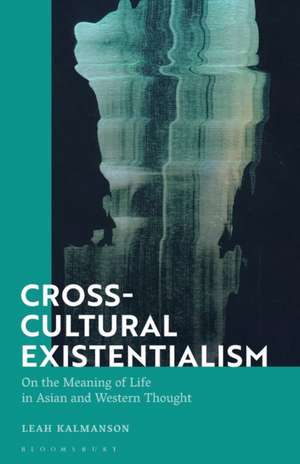Cross-Cultural Existentialism: On the Meaning of Life in Asian and Western Thought
Autor Dr Leah Kalmansonen Limba Engleză Paperback – 23 mar 2022
| Toate formatele și edițiile | Preț | Express |
|---|---|---|
| Paperback (1) | 195.73 lei 6-8 săpt. | |
| Bloomsbury Publishing – 23 mar 2022 | 195.73 lei 6-8 săpt. | |
| Hardback (1) | 595.82 lei 6-8 săpt. | |
| Bloomsbury Publishing – 16 sep 2020 | 595.82 lei 6-8 săpt. |
Preț: 195.73 lei
Preț vechi: 256.77 lei
-24% Nou
Puncte Express: 294
Preț estimativ în valută:
37.46€ • 38.70$ • 31.17£
37.46€ • 38.70$ • 31.17£
Carte tipărită la comandă
Livrare economică 25 martie-08 aprilie
Preluare comenzi: 021 569.72.76
Specificații
ISBN-13: 9781350205635
ISBN-10: 135020563X
Pagini: 200
Dimensiuni: 138 x 216 mm
Greutate: 0.24 kg
Editura: Bloomsbury Publishing
Colecția Bloomsbury Academic
Locul publicării:London, United Kingdom
ISBN-10: 135020563X
Pagini: 200
Dimensiuni: 138 x 216 mm
Greutate: 0.24 kg
Editura: Bloomsbury Publishing
Colecția Bloomsbury Academic
Locul publicării:London, United Kingdom
Caracteristici
Grounds existentialism in real-world case-studies from Asian traditions, including karmic merit, meditative concentration, Buddhist theories of world-creation, Chinese body-alignment techniques and sage-wisdom
Notă biografică
Leah Kalmanson is Associate Professor and Bhagwan Adinath Professor of Jain Studies in the Department of Philosophy and Religion at the University of North Texas, USA.
Cuprins
Introduction: Toward a Speculative Existentialism1. Meaningful Dilemmas: Existential Inquiry in the Western Tradition2. The Creation of New Values, Part I: Karmic Transformations3. The Creation of New Values, Part II: Cosmic Correspondences4. Rituals for Existential Re-HabituationConclusion: Return to Inner ExperienceBibliographyIndex
Recenzii
Cross-Cultural Existentialism is a very accessible text that quite successfully creates connections amid a small collection of European philosophical texts, a much larger corpus of Asian texts from the Song Dynasty to twentieth-century Korea, and a body of scholarship on Mahayana Buddhism. While that may seem ambitious, Kalmanson diligently synthesizes her argument with surprising efficiency.
A defense of trans-egoic value creation is perhaps the best way to characterize the chief goal of this brief, innovative text. With an aim that is both theoretical and practical in nature, Kalmanson (philosophy and religion, Drake Univ.) highlights the common, recurring metaphysical and epistemological challenges present in Western philosophy and proposes a new orientation, one that is qi based.
Leah Kalmanson's work exemplifies what is best about the new wave of cross-cultural philosophizing. Not content to merely compare ideas, she elegantly and insightfully weaves sources from Korea and China together with others from Europe and North America to challenge, enrich, and ultimately re-direct existentialism.
In Cross-Cultural Existentialism, Kalmanson takes her long-standing commitment to comparative or cross-cultural methodological interventions to the next level. Going beyond the framework of East-West comparison, Kalmanson creates a new qi-based vocabulary for meaning-making in the 21st century-a speculative existentialism centered in daily practice leading to radical transformation of our shared conditions. This is philosophy at its finest-creative, nuanced, accessible, and meaningful.
It is packed with thought- provoking new interpretations and musings on how philosophy could become once again a practice- oriented enterprise that has the ability to combine and syncretize diverse theoretical approaches and ritual practices which have arisen at widely different places and times.
This wonderful book lives up to the ambition of its title. Kalmanson does more than deftly weave together strands from Western existentialism and East-Asian transformative philosophies into an informative tapestry. She also draws on linguistic and practice-based resources in ancient Chinese philosophy to breathe new life into current existentialist thinking.
Cross-Cultural Existentialism offers fascinating answers to the questions of philosophy's relation to our lives. Drawing from diverse East Asian traditions, this book revives Asian philosophical concepts such as qi (energy), li (principle), and meditation in the context of today's existential reality and thus resuscitates philosophy from theoretical slumber.
Cross-Cultural Existentialism offers [a] perspective that challenges commonplace notions of philosophy... a breath of fresh air within a sea of academic jargon.
A defense of trans-egoic value creation is perhaps the best way to characterize the chief goal of this brief, innovative text. With an aim that is both theoretical and practical in nature, Kalmanson (philosophy and religion, Drake Univ.) highlights the common, recurring metaphysical and epistemological challenges present in Western philosophy and proposes a new orientation, one that is qi based.
Leah Kalmanson's work exemplifies what is best about the new wave of cross-cultural philosophizing. Not content to merely compare ideas, she elegantly and insightfully weaves sources from Korea and China together with others from Europe and North America to challenge, enrich, and ultimately re-direct existentialism.
In Cross-Cultural Existentialism, Kalmanson takes her long-standing commitment to comparative or cross-cultural methodological interventions to the next level. Going beyond the framework of East-West comparison, Kalmanson creates a new qi-based vocabulary for meaning-making in the 21st century-a speculative existentialism centered in daily practice leading to radical transformation of our shared conditions. This is philosophy at its finest-creative, nuanced, accessible, and meaningful.
It is packed with thought- provoking new interpretations and musings on how philosophy could become once again a practice- oriented enterprise that has the ability to combine and syncretize diverse theoretical approaches and ritual practices which have arisen at widely different places and times.
This wonderful book lives up to the ambition of its title. Kalmanson does more than deftly weave together strands from Western existentialism and East-Asian transformative philosophies into an informative tapestry. She also draws on linguistic and practice-based resources in ancient Chinese philosophy to breathe new life into current existentialist thinking.
Cross-Cultural Existentialism offers fascinating answers to the questions of philosophy's relation to our lives. Drawing from diverse East Asian traditions, this book revives Asian philosophical concepts such as qi (energy), li (principle), and meditation in the context of today's existential reality and thus resuscitates philosophy from theoretical slumber.
Cross-Cultural Existentialism offers [a] perspective that challenges commonplace notions of philosophy... a breath of fresh air within a sea of academic jargon.
